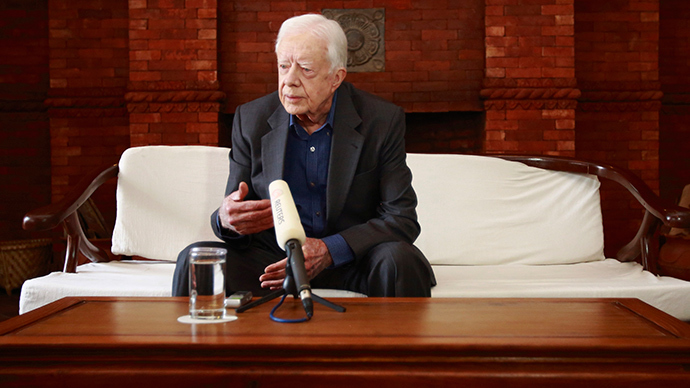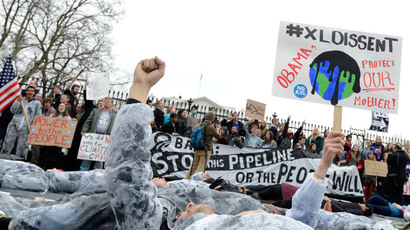Jimmy Carter among Nobel Prize winners urging Keystone rejection

Jimmy Carter has become first former US president to speak out against the controversial Keystone XL project, which would see tar sands oil flow from Canada to the US.
Carter joined a group of nine other Nobel Prize winners who signed a letter to President Obama, urging him not to endorse the plan.
“You stand on the brink of making a choice that will define your legacy on one of the greatest challenges humanity has ever faced - climate change,” the letter reads.
The Nobel laureates argue that “the tar sands are among the world’s most polluting oil” and say that they have the support of 2 million people “who submitted their comments in the national interest determination process rejecting the pipeline."
The letter describes the Keystone XL decision as one of the most crucial for the Obama administration and one that will go down in history.
“A rejection would signal a new course for the world’s largest economy,” the appeal to the US President reads. “You know as well as we do the powerful precedent that this would set. This leadership by example would usher in a new era where climate change and pollution is given the urgent attention and focus it deserves in a world where the climate crisis is already a daily struggle for so many.”
The letter sparked immediate reaction from the Canadian government, who are campaigning for the approval of the project. The statement by the Prime Minister’s office reiterated the economic benefits Keystone entails.
"Our government’s position on the Keystone XL project is clear: the project will create tens of thousands of jobs for workers on both sides of the border, which will create tremendous economic benefits for both countries," the statement said.
It also recalled Carter’s own experience as president, when the Iranian revolution crippled supplies from the Middle East and oil prices soared in the US.
"In addition, Mr. Carter knows from his time as president during the 1979 energy crisis, there are benefits to having access to oil from stable, secure partners like Canada”.
By having signed the anti-Keystone letter, Carter has become the first ex-president to urge the rejection of the project.
Previously, George W. Bush described the plan for the pipeline as a “no-brainer.”
“The clear goal ought to be how to get the private sector to grow,” Bush said in March 2012 as cited by Bloomberg. “If you say that, then an issue like the Keystone pipeline becomes an easy issue.”
Bill Clinton objected to the pipeline going through Nebraska's Sandhills region, but said at a 2012 summit of the Advanced Research Projects Agency-Energy (ARPA-E) that if the route was changed “we should embrace” the project.
Keystone XL is a $7 billion oil pipeline designed to carry tar sands oil from Alberta's oil sands in Canada to refineries on the US Gulf Coast. Up to 800,000 barrels of crude oil a day are expected to move along the pipeline.
The project has raised much controversy in the US, with environmentalists staging regular protests citing the potential negative environmental impact.
A decision on Keystone is expected to be made before the summer.
A survey, released by the US State Department in January, raised few objections regarding the environmental impact of the project, paving the way for its potential approval.
Alternative reports speak of high risks. A study by the University of Toronto-Scarborough, published in February, warned that tar sands oil production was associated with much greater emissions of harmful carcinogens than previously thought.














